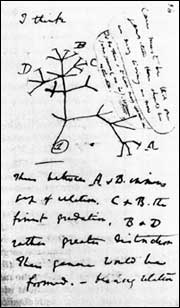
All available evidence supports the central conclusions of evolutionary theory, that life on Earth has evolved and that species share common ancestors. Biologists are not arguing about these conclusions. But they are trying to figure out how evolution happens, and that’s not an easy job. It involves collecting data, proposing hypotheses, creating models, and evaluating other scientists’ work. These are all activities that we can, and should, hold up to our checklist and ask the question: are they doing science?
All sciences ask questions about the natural world, propose explanations in terms of natural processes, and evaluate these explanations using evidence from the natural world. Evolutionary biology is no exception. Darwin’s basic conception of evolutionary change and diversification (illustrated with a page from his notebook at right) explains many observations in terms of natural processes and is supported by evidence from the natural world.
Some of the questions that evolutionary biologists are trying to answer include:
